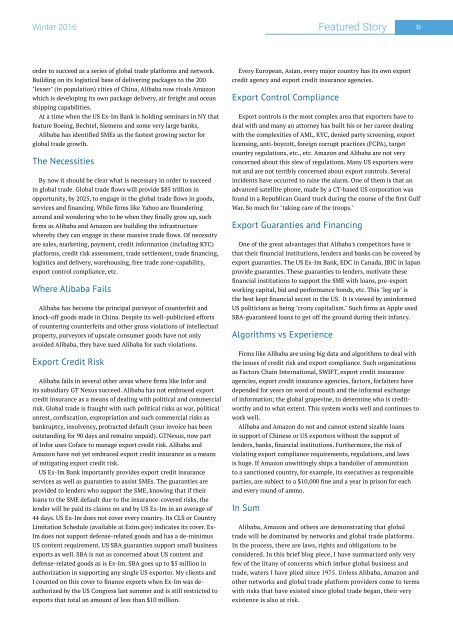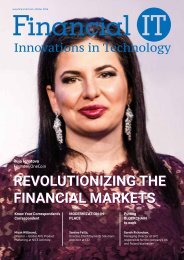Revolutionizing the Financial Markets
Create successful ePaper yourself
Turn your PDF publications into a flip-book with our unique Google optimized e-Paper software.
Winter 2016 Featured Story 33<br />
order to succeed as a series of global trade platforms and network.<br />
Building on its logistical base of delivering packages to <strong>the</strong> 200<br />
"lesser" (in population) cities of China, Alibaba now rivals Amazon<br />
which is developing its own package delivery, air freight and ocean<br />
shipping capabilities.<br />
At a time when <strong>the</strong> US Ex-Im Bank is holding seminars in NY that<br />
feature Boeing, Bechtel, Siemens and some very large banks,<br />
Alibaba has identified SMEs as <strong>the</strong> fastest growing sector for<br />
global trade growth.<br />
The Necessities<br />
By now it should be clear what is necessary in order to succeed<br />
in global trade. Global trade flows will provide $85 trillion in<br />
opportunity, by 2025, to engage in <strong>the</strong> global trade flows in goods,<br />
services and financing. While firms like Yahoo are floundering<br />
around and wondering who to be when <strong>the</strong>y finally grow up, such<br />
firms as Alibaba and Amazon are building <strong>the</strong> infrastructure<br />
whereby <strong>the</strong>y can engage in <strong>the</strong>se massive trade flows. Of necessity<br />
are sales, marketing, payment, credit information (including KYC)<br />
platforms, credit risk assessment, trade settlement, trade financing,<br />
logistics and delivery, warehousing, free trade zone-capability,<br />
export control compliance, etc.<br />
Where Alibaba Fails<br />
Alibaba has become <strong>the</strong> principal purveyor of counterfeit and<br />
knock-off goods made in China. Despite its well-publicized efforts<br />
of countering counterfeits and o<strong>the</strong>r gross violations of intellectual<br />
property, purveyors of upscale consumer goods have not only<br />
avoided Alibaba, <strong>the</strong>y have sued Alibaba for such violations.<br />
Export Credit Risk<br />
Alibaba fails in several o<strong>the</strong>r areas where firms like Infor and<br />
its subsidiary GT Nexus succeed. Alibaba has not embraced export<br />
credit insurance as a means of dealing with political and commercial<br />
risk. Global trade is fraught with such political risks as war, political<br />
unrest, confiscation, expropriation and such commercial risks as<br />
bankruptcy, insolvency, protracted default (your invoice has been<br />
outstanding for 90 days and remains unpaid). GTNexus, now part<br />
of Infor uses Coface to manage export credit risk. Alibaba and<br />
Amazon have not yet embraced export credit insurance as a means<br />
of mitigating export credit risk.<br />
US Ex-Im Bank importantly provides export credit insurance<br />
services as well as guaranties to assist SMEs. The guaranties are<br />
provided to lenders who support <strong>the</strong> SME, knowing that if <strong>the</strong>ir<br />
loans to <strong>the</strong> SME default due to <strong>the</strong> insurance-covered risks, <strong>the</strong><br />
lender will be paid its claims on and by US Ex-Im in an average of<br />
44 days. US Ex-Im does not cover every country. Its CLS or Country<br />
Limitation Schedule (available at Exim.gov) indicates its cover. Ex-<br />
Im does not support defense-related goods and has a de-minimus<br />
US content requirement. US SBA guaranties support small business<br />
exports as well. SBA is not as concerned about US content and<br />
defense-related goods as is Ex-Im. SBA goes up to $5 million in<br />
authorization in supporting any single US exporter. My clients and<br />
I counted on this cover to finance exports when Ex-Im was deauthorized<br />
by <strong>the</strong> US Congress last summer and is still restricted to<br />
exports that total an amount of less than $10 million.<br />
Every European, Asian, every major country has its own export<br />
credit agency and export credit insurance agencies.<br />
Export Control Compliance<br />
Export controls is <strong>the</strong> most complex area that exporters have to<br />
deal with and many an attorney has built his or her career dealing<br />
with <strong>the</strong> complexities of AML, KYC, denied party screening, export<br />
licensing, anti-boycott, foreign corrupt practices (FCPA), target<br />
country regulations, etc., etc. Amazon and Alibaba are not very<br />
concerned about this slew of regulations. Many US exporters were<br />
not and are not terribly concerned about export controls. Several<br />
incidents have occurred to raise <strong>the</strong> alarm. One of <strong>the</strong>m is that an<br />
advanced satellite phone, made by a CT-based US corporation was<br />
found in a Republican Guard truck during <strong>the</strong> course of <strong>the</strong> first Gulf<br />
War. So much for "taking care of <strong>the</strong> troops."<br />
Export Guaranties and Financing<br />
One of <strong>the</strong> great advantages that Alibaba's competitors have is<br />
that <strong>the</strong>ir financial institutions, lenders and banks can be covered by<br />
export guaranties. The US Ex-Im Bank, EDC in Canada, JBIC in Japan<br />
provide guaranties. These guaranties to lenders, motivate <strong>the</strong>se<br />
financial institutions to support <strong>the</strong> SME with loans, pre-export<br />
working capital, bid and performance bonds, etc. This "leg up" is<br />
<strong>the</strong> best kept financial secret in <strong>the</strong> US. It is viewed by uninformed<br />
US politicians as being "crony capitalism." Such firms as Apple used<br />
SBA-guaranteed loans to get off <strong>the</strong> ground during <strong>the</strong>ir infancy.<br />
Algorithms vs Experience<br />
Firms like Alibaba are using big data and algorithms to deal with<br />
<strong>the</strong> issues of credit risk and export compliance. Such organizations<br />
as Factors Chain International, SWIFT, export credit insurance<br />
agencies, export credit insurance agencies, factors, forfaiters have<br />
depended for years on word of mouth and <strong>the</strong> informal exchange<br />
of information; <strong>the</strong> global grapevine, to determine who is creditworthy<br />
and to what extent. This system works well and continues to<br />
work well.<br />
Alibaba and Amazon do not and cannot extend sizable loans<br />
in support of Chinese or US exporters without <strong>the</strong> support of<br />
lenders, banks, financial institutions. Fur<strong>the</strong>rmore, <strong>the</strong> risk of<br />
violating export compliance requirements, regulations, and laws<br />
is huge. If Amazon unwittingly ships a bandolier of ammunition<br />
to a sanctioned country, for example, its executives as responsible<br />
parties, are subject to a $10,000 fine and a year in prison for each<br />
and every round of ammo.<br />
In Sum<br />
Alibaba, Amazon and o<strong>the</strong>rs are demonstrating that global<br />
trade will be dominated by networks and global trade platforms.<br />
In <strong>the</strong> process, <strong>the</strong>re are laws, rights and obligations to be<br />
considered. In this brief blog piece, I have summarized only very<br />
few of <strong>the</strong> litany of concerns which imbue global business and<br />
trade, waters I have plied since 1975. Unless Alibaba, Amazon and<br />
o<strong>the</strong>r networks and global trade platform providers come to terms<br />
with risks that have existed since global trade began, <strong>the</strong>ir very<br />
existence is also at risk.







